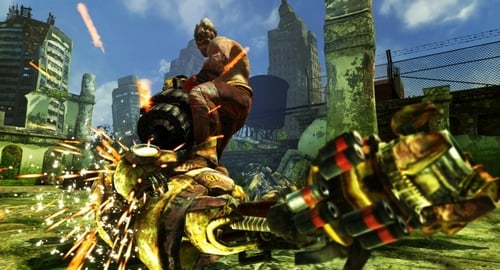Review The central story of Enslaved: Odyssey to the West is one accustomed to poetic licence and dilution. The original 16th Century Chinese novel Journey to the West was itself an amalgamation of supernatural fables based loosely on a 7th Century Buddhist monk's pilgrimage to India.
Centuries later, in 1942, a heavily abridged English translation popularised the story as Monkey: A Folk Tale of China. But, of course, the fabled journey of Tripiktaka, Monkey, Pigsy and Sandy became familiar to us less scholarly mortals through the cult 1970s TV series Monkey – perhaps the most contentious treatment of all as a Japanese production with an all-Japanese cast.

It's hard to see the light
It seems perfectly natural, then, that the first videogame translation takes place 150 years in the future, amid the post-apocalyptic wastelands of the United States. Fleeing their mysterious enslavers, Trip finds Monkey wearing that famous subjugating headband, and with it forces him into helping her - her quest now one of freedom rather than enlightenment; her enslavement of Monkey born of selfishness rather than divine providence.
A beautiful blanket of vegetation camouflages a perilous continent populated with battle-ready mechs from a long-forgotten war. Trip's genius hacking skills can't alone combat the horde of mechs, whose primary function remains the extermination of all humans, and so enslaves the brutish, brawny loner, promising to set him free once safely home.

You know the drill
Thus begins Enslaved’s ten-hour long buddy adventure. Part written by Alex The Beach Garland, and directed and starring Andy 'Gollum, Ian Dury' Serkis, it's clear from the outset that Enslaved's ambitions lie in furthering the storytelling capabilities of videogames. But while Serkis produces one of gaming's finest performances as Monkey, the collaboration between Garland and developer Ninja Theory proves far less successful in realising its ambitions.
